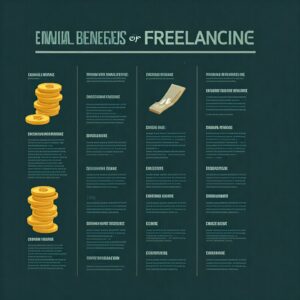
Freelancing vs. Remote Web Development Jobs: Choosing Your Path to Freedom

Are you a young, aspirational web designer or developer who is fed up with the conventional office environment? Have you given remote freelancing any thought? The two primary benefits of remote freelancing over a regular remote development or designer job—the ability to set your own hours and the cash rewards—will be discussed in this in-depth discussion of Freelancing vs. Remote Web Development Jobs in this blog post.
The Financial Advantages of Freelancing

The possibility of earning much more money as a freelancer is one of the main distinctions between freelancing vs. remote web development jobs. The average hourly wage for a web developer or designer in a regular position is frequently far less than what independent contractors may charge their clients, as our speaker discusses.
Our visitor was only earning about $14 USD per hour when he first started working as a web developer. He can now, however, charge $65 to $85 per hour or more as a freelancer. That is a significant difference! This discrepancy can be explained simply: in order for your employer to make a profit and pay its overhead, they must receive a portion of the money you bring in. As a freelancer, you get to keep a much larger portion of the fees your clients pay.
As our guest points out, the boss or business owner who hires you in a traditional job role is likely charging their clients $85 or more per hour for your services. They need to cover the costs of running an office, paying other employees, and generating a profit margin. As a freelancer, you can cut out the middleman and charge clients directly, keeping the majority of that lucrative hourly rate for yourself.
Earning Potential is Uncapped as a Freelancer
This financial benefit of working for yourself is quite liberating. Freelancers can scale their earnings according to the number of clients they take on and the rates they charge, as opposed to being restricted to a set salary or hourly wage. According to our guest, he deliberately keeps his workload to about 20 hours per week since it allows him to maintain a decent work-life balance and still satisfy his financial needs.
However, a freelancer who is willing to take on a heavier workload can potentially earn a six-figure income or more. The video description notes that this informative discussion is perfect for “college students or anyone looking to break into the world of remote web development or design,” and the earning potential of freelancing is a huge draw for many aspiring professionals in these fields of freelancing vs. remote web development jobs.
Competing with Agencies, Not Employees
The fact that you are competing with company executives and agency owners rather than other workers is another significant financial benefit of freelancing. Your earning potential in regular employment is limited by what your employer is willing to pay. You determine your own prices as a freelancer depending on the value you offer customers.
According to our guest, clients are frequently willing to pay freelancers the same high fees when they are accustomed to paying agency owners between $65 and $85 per hour. After all, you are offering the same degree of competence and caliber of work as a proficient web developer or designer. The sole distinction is the absence of the overhead expenses associated with operating a full-service agency.
This dynamic flips the script on the traditional employment model. Rather than competing with other employees for a limited pool of higher-paying roles, freelancers can position themselves as the more cost-effective and flexible option compared to large agencies. Clients are often happy to pay freelancers top dollar, as long as the quality of work remains high.
The Freedom of Freelancing

In addition to the financial advantages, the freedom and flexibility of freelancing is another major draw for many web developers and designers. Our guest eloquently describes freelancing as being “the person in charge of your own destiny”—a stark contrast to the constraints of a traditional job.
Goodbye, Micromanagement
Working on your own terms without the continual supervision and micromanagement that might accompany a typical job is one of the main benefits of freelancing. According to our guest, his previous positions frequently required him to carry out duties that were pointless or unimportant, such as carefully going over inventory and cleaning the office at the beginning and end of each day.
You are not subject to a boss who controls your schedule when you work as a freelancer. You can instead concentrate on your primary duties, which include providing excellent client service and results. Naturally, you will still have to complete your contractual commitments and meet deadlines. The ability to organize your own workflow on a daily basis, however, is a significant benefit of freelance.
Flexible Scheduling and Work-Life Balance
Another key freedom of freelancing is the ability to set your own schedule. As our guest explains, this allows freelancers to better integrate their work and personal lives. Rather than being tied to a rigid 9-to-5 schedule, freelancers can choose to work fewer hours per week, take spontaneous vacations, or adjust their schedule to accommodate other commitments.
According to the video description, this conversation is ideal for “college students or anyone trying to get into the realm of remote web development or design,” and many young people find the scheduling flexibility of freelancing to be very alluring. Freelance employment provides a degree of work-life balance that can be hard to get in a regular career, whether it be taking a long weekend trip with friends or just having the flexibility to get up from your desk for a lunchtime workout.
Choosing Your Own Workload
In addition to setting your own schedule, freelancers also have the freedom to choose how much work they take on. Our guest explains that he purposefully limits his workload to around 20 hours per week, as that is enough to meet his financial needs while allowing him to maintain a healthy work-life balance.
However, independent contractors who are prepared to take on more work may be able to make six figures or more. Instead of being forced to follow an employer’s wishes, the important thing is to be free to choose for oneself.
Naturally, there are obligations associated with this freedom. In addition to being proactive in looking for new clients and tasks, freelancers must practice time and workload discipline. The freedom to choose your own path and work on your own terms is a major lure of the freelance lifestyle, but for many web developers and designers, the sacrifice is well worth it.
Weighing the Pros and Cons
Ultimately, the decision to pursue a remote job or freelance work will come down to your personal preferences and priorities. Both paths offer unique advantages and challenges, and the “right” choice will depend on your individual circumstances and goals.
The Pros of Remote Employment
- Steady, predictable income
- Access to benefits like health insurance and retirement plans
- Potential for career advancement and professional development opportunities
- Structured work environment and clear job responsibilities
The Pros of Freelancing
- Significantly higher earning potential
- Flexibility to set your own schedule and work-life balance
- Freedom from micromanagement and the ability to work on your own terms
- Opportunity to build a diverse client base and portfolio of work
Weighing the Tradeoffs
As you can see, there are distinct benefits to both freelance work and distant employment. The secret is to give considerable thought to your long-term objectives, preferences, and personal needs. Are you prepared to forgo some of the independence and income potential of freelancing in favor of the security and advantages of working remotely? Or, in order to optimize your earning potential and work-life balance, are you prepared to accept the obligations and hardships of being your own boss?
There’s no one-size-fits-all answer, and the “right” choice will depend on your individual circumstances. But by understanding the key differences between these two paths, you can make a more informed decision about which option is the best fit for you. And if you’re still on the fence, the full podcast episode is a great resource to dive deeper into the pros and cons of remote work versus freelancing.
Conclusion
Whether you are a seasoned web developer or designer seeking a shift or a college student just beginning to consider your career possibilities, the decision between freelancing and remote work is crucial. You can choose the best course of action for yourself if you are aware of the independence and financial benefits that come with freelancing.
The most important thing is to concentrate on your own requirements, priorities, and long-term objectives. Both remote work and freelancing may be very lucrative and satisfying career options with the correct attitude and strategy. It is up to you to decide between the financial gain and flexibility of freelancing and the security and structure of remote employment.
Follow https://www.digitalpluto.co.in/ for more latest updates about web development.





